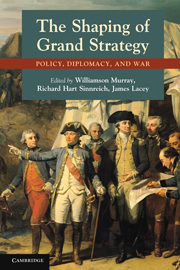Book contents
- Frontmatter
- Contents
- Contributors
- 1 Thoughts on grand strategy
- 2 The grand strategy of the grand siècle: Learning from the wars of Louis XIV
- 3 Strategic culture and the Seven Years' War
- 4 Strategy as character: Bismarck and the Prusso-German question, 1862–1878
- 5 About turn: British strategic transformation from Salisbury to Grey
- 6 British grand strategy, 1933–1942
- 7 Toward a strategy: Creating an American strategy for global war, 1940–1943
- 8 Harry S. Truman and the forming of American grand strategy in the Cold War, 1945–1953
- 9 Patterns of grand strategy
- Index
- References
6 - British grand strategy, 1933–1942
Published online by Cambridge University Press: 05 June 2012
- Frontmatter
- Contents
- Contributors
- 1 Thoughts on grand strategy
- 2 The grand strategy of the grand siècle: Learning from the wars of Louis XIV
- 3 Strategic culture and the Seven Years' War
- 4 Strategy as character: Bismarck and the Prusso-German question, 1862–1878
- 5 About turn: British strategic transformation from Salisbury to Grey
- 6 British grand strategy, 1933–1942
- 7 Toward a strategy: Creating an American strategy for global war, 1940–1943
- 8 Harry S. Truman and the forming of American grand strategy in the Cold War, 1945–1953
- 9 Patterns of grand strategy
- Index
- References
Summary
My chief impression was one of impending change and fears. Fear: individual, racial, national, and economic. Munich has withdrawn the lynchpin which held Eastern Europe together and the fragments are preparing to resort themselves.…Everyone is apprehensive as to how this process will affect him individually. Everywhere there is the pathetic hope in the breasts of these ignorant people that England will somehow save them from the fate she did nothing to avert from Czechoslovakia.
There is no doubt that throughout the 1930s the British Empire confronted diverse threats on the periphery: in the Pacific with the rise of an antagonistic and aggressive Japan, in the Mediterranean with Benito Mussolini's and Italy's overweening ambition, and directly across the North Sea with the rise of Adolf Hitler's Nazi Germany and the increasing lethality of air power. Indeed, if there is such a thing as imperial overstretch, this was the ultimate case. Yet, all great powers throughout history have confronted the danger of overstretch in considering their national interests. Above all, grand strategy demands a willingness to weigh and balance risks: those of the present against those of the future, those of the immediate neighborhood against those of distant provinces, and those of the more dangerous against the lesser.
Unfortunately for their nation, their allies, and the course of history, British leaders consistently failed to address in their grand strategy in the 1930s the hard realities of the international environment.
- Type
- Chapter
- Information
- The Shaping of Grand StrategyPolicy, Diplomacy, and War, pp. 147 - 181Publisher: Cambridge University PressPrint publication year: 2011
References
- 1
- Cited by

